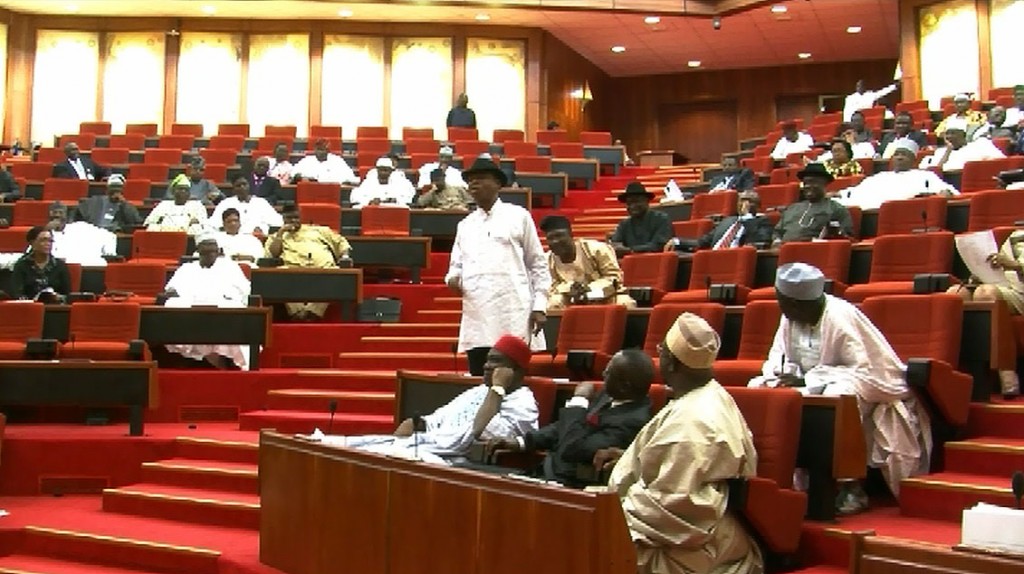The ongoing probe of the power sector from 1999 till date by the Senate ad hoc committee was characterized by drama and confusion yesterday, as the proceeding was disrupted by power failure eight times.
Yesterday’s proceeding started at about 11:30a.m. and ended abruptly at 4p.m. due to about 15 minutes of power failure at intervals, for eight different times, from 2p.m. when the Permanent Secretary, Ministry of Power, Ambassador Godknows Igali, was making a submission on behalf of the various electricity companies.
The situation forced operators from the power sector to make use of their phone light and video camera light to make presentation before the committee.
Despite the situation, the lawmakers continued with the proceedings without microphones and other electrical appliances needed. The cameramen, on their part, had to use their camera lights to capture the meeting.
Following the power outage, the committee had no choice but to resort to the use of rechargeable lamps and camera lights
Chairman of the Committee, Abubakar Kyari (APC, Borno North) also had a dose of the power failure as he was interrupted while commenting on issues raised by some of the stakeholders.
‘It’s sabotage’
Moved by the development, Senator Kyari, after the session, told journalists that the committee would investigate what led to the power outages during the session, alleging that it was sabotage aimed at frustrating the committee.
He vowed that the public hearing proper on the sector would hold in due course, adding “the power outages experienced here today (yesterday) further underscores the relevance of this committee at this critical time, but we shall investigate whether or not they are deliberate.”
Other stakeholders of the power sector, who were caught in the power outage, while making presentations, were the Director-General of Bureau of Public Enterprises, BPE, Benjamin Ezreal Dikki; Chairman of National Electricity Regulatory Commission, NERC, Sam Amadi and some of the Managing Directors of electricity Distribution Companies, DISCOs.
Investors state challenges
Earlier, investors in the sector in their various submissions lamented that they were running it at great losses on monthly basis due to myriad of factors.
In his presentation, the Managing Director of Enugu Distribution Company, Mr. Robert Dickerman, who spoke on behalf of all DISCOs, disclosed that the entire industry was being run at a deficit of N20 billion per month, which he argued was attributable to the fact that over 50 percent of electricity consumers were not metered and about 30 percent were not even on the billing system of the service providers.
He also alleged that the N100 billion subsidy injection into the sector promised by the Federal Government was not fulfilled.
The CEO, Ibadan Electricity Generating Company, Adeoye Fagbembi, who spoke on behalf of the six GENCOs, said transmission loss between them and the electricity distributors have been a big issue.
The BPE Director- General, Benjamin Dikki, in his submission, said the Central Bank of Nigeria, CBN, has paid N5 billion of the N100 billion promised by the government, just as he admitted that the sector was presently being run at a loss by the investors, adding that the losses at initial stages were envisaged as embedded in the performance agreement reached with the investors.
50% of Nigerians don’t use meter
In his own presentation, Chairman of NERC, Dr. Amadi, who refuted allegations that the Transmission Company of Nigeria, TCN, will soon be privatized by the Federal Government, revealed that over 50 percent of Nigerians do not have meters, thereby reducing revenue generation potentials of distribution company.
Amadi noted that lack of meters, which was a major problem, had left many Nigerians saddened, saying that one megawatt of power cost as much as $1 million.
… on power distribution
He said: “We are working hard so that none of the discos fail. Consumers are very angry about lack of meter. Only less than 50 percent of Nigerians have meters. It is one of the major problems. In the past decade, we did not invest in metering.
“A moderator brought the idea of paying for meter since customers cannot wait for too long; the customers can pay for their own meter but when the new owners came, they had to take some time to understand the way it goes.”
He agreed that metering is the major problem in the power sector because it is more expensive although it will help the country save revenue.
According to him, “each time we hit 4500 megawatts, people always say that the electricity has improved and there is always a level of comfort. We also want to put more pressure on the distribution companies and they want to see Mgbede generation.
“What has delayed many of these companies till now is because the licences could not get financed.
“In the next 20 years we will be able to have about 2000 megawatts.”
He concluded by saying that the power sector was getting better as there is need for improvement in capital investment, which should come from the private sectors.







